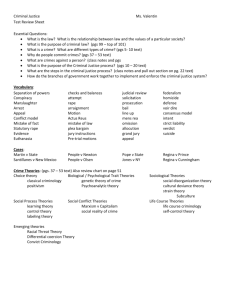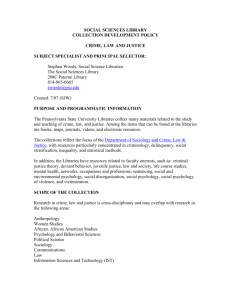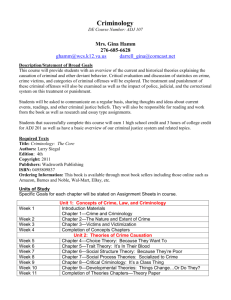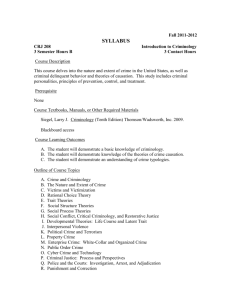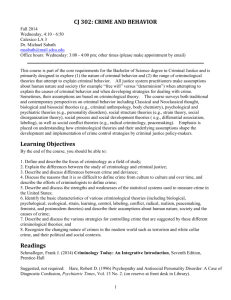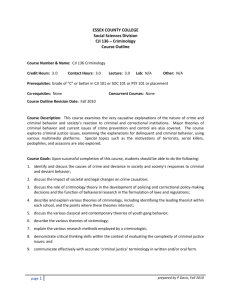FLORIDA ATLANTIC UNIVERSITY – DAVIE CAMPUS
advertisement
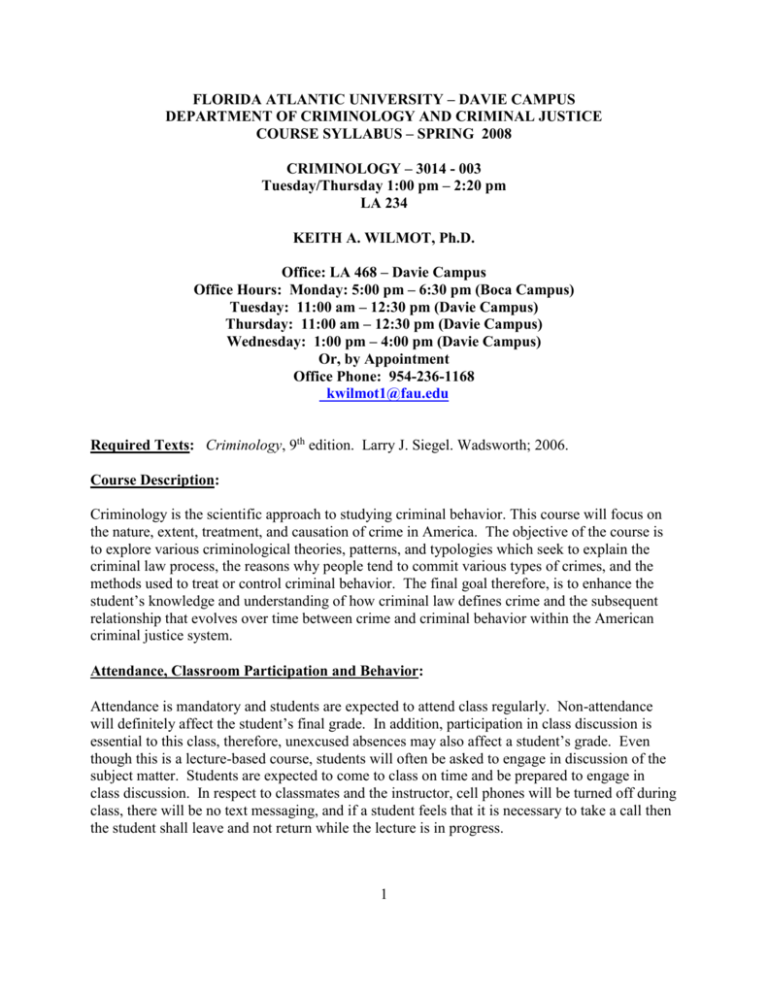
FLORIDA ATLANTIC UNIVERSITY – DAVIE CAMPUS DEPARTMENT OF CRIMINOLOGY AND CRIMINAL JUSTICE COURSE SYLLABUS – SPRING 2008 CRIMINOLOGY – 3014 - 003 Tuesday/Thursday 1:00 pm – 2:20 pm LA 234 KEITH A. WILMOT, Ph.D. Office: LA 468 – Davie Campus Office Hours: Monday: 5:00 pm – 6:30 pm (Boca Campus) Tuesday: 11:00 am – 12:30 pm (Davie Campus) Thursday: 11:00 am – 12:30 pm (Davie Campus) Wednesday: 1:00 pm – 4:00 pm (Davie Campus) Or, by Appointment Office Phone: 954-236-1168 kwilmot1@fau.edu Required Texts: Criminology, 9th edition. Larry J. Siegel. Wadsworth; 2006. Course Description: Criminology is the scientific approach to studying criminal behavior. This course will focus on the nature, extent, treatment, and causation of crime in America. The objective of the course is to explore various criminological theories, patterns, and typologies which seek to explain the criminal law process, the reasons why people tend to commit various types of crimes, and the methods used to treat or control criminal behavior. The final goal therefore, is to enhance the student’s knowledge and understanding of how criminal law defines crime and the subsequent relationship that evolves over time between crime and criminal behavior within the American criminal justice system. Attendance, Classroom Participation and Behavior: Attendance is mandatory and students are expected to attend class regularly. Non-attendance will definitely affect the student’s final grade. In addition, participation in class discussion is essential to this class, therefore, unexcused absences may also affect a student’s grade. Even though this is a lecture-based course, students will often be asked to engage in discussion of the subject matter. Students are expected to come to class on time and be prepared to engage in class discussion. In respect to classmates and the instructor, cell phones will be turned off during class, there will be no text messaging, and if a student feels that it is necessary to take a call then the student shall leave and not return while the lecture is in progress. 1 Exams and Grading: There will be four exams worth 100 points per exam. Each exam will consist of multiple-choice, true/false, short answer, and essay questions. The substance of the questions will come from class lectures, PowerPoint presentations, video reviews, and the text. Thirty percent of each exam will come from the essay portion of the test. Review terms will be handed out prior to each test. Make-up exams will only be given in the event of unforeseen emergency circumstances. The instructor must be notified immediately of these circumstances and may request documentation of these circumstances. The instructor reserves the right to either deny or re-schedule the time and date of the make-up exam. Grading will be determined by the following grading scale. In addition, class participation may have an effect on the overall grade. For example, the instructor also reserves the right to use class participation as a means to determine a final grade for those students that find themselves between an “A” or “B,” or between a “B” or “C;” or, between a plus or minus; etc. Extra credit – none. Grading is as follows: Total Point Grade Scale 100 100 100 100 400 Total Points 1st exam 2nd exam 3rd exam 4th exam 360-400 = A 320-359 = B 280-319 = C 240-279 = D 239 or less = F Academic Dishonesty and Plagiarism: University regulations regarding academic misconduct, as set forth in the Student Code of Conduct (section 4.007) will be strictly enforced. Any student caught cheating will receive an F for the course. ADA Statement: The Department of Criminology and Criminal Justice does not discriminate on the basis of an individual’s disability as required by the American with Disabilities Act. Students who require special accommodations due to disability to properly execute coursework must register with the Office for Students with Disabilities (OSD) located in Boca – SU 133 (561-297-3880), in Davie – MOD 1 (954-236-1222), or in Jupiter – SR 117 (561-799-8585) and follow all OSD procedures. Teaching Strategies The class will be presented predominately in a lecture and discussion format. Student interaction is greatly encouraged. Presentations and discussion questions will be in PowerPoint format which will be available on the following websites: FSU Blackboard and www.keithwilmot.com. 2 This way you can either refresh your notes in case of an excused absence. The schedule is flexible and the exam dates are tentative (except the final exam date which is determined by the university). The Schedule and Course Outline Readings and Lectures: Chapter One – Crime, Criminology, and the Criminal Law Chapter Two – The Nature and Extent of Crime Chapter Four – Choice Theories Chapter Five - Trait Theories Review EXAM 1 (tentative January 31st) Chapter Three – Victims and Victimization Chapter Six - Social Structure Theories Chapter Fourteen - The Criminal Justice System Chapter Seven - Social Process Theories: Learning, Control, and Reaction Review EXAM 2 (tentative 26th or 28th) March 4th and 6th: Spring Break – no class Chapter Fifteen - Police and Law Enforcement Chapter Eight – Social Conflict Theories: Critical Criminology and Restorative Justice Chapter Ten – Violent Crime Review EXAM 3 (tentative March 27th) Chapter Nine – Developmental Theories: Life Course and Latent Trait Chapter Sixteen - The Judicatory Process / Sentencing page 570 Chapter Twelve - Enterprise Crime: White-Collar, Cyber, and Organized Crime Chapter Thirteen - Public Order Crime Chapter Eleven – Property Crime Review for Final Exam: April 22nd Reading Day: April 24th FINAL EXAM (date will conform to FAU’s final exam schedule) 3

